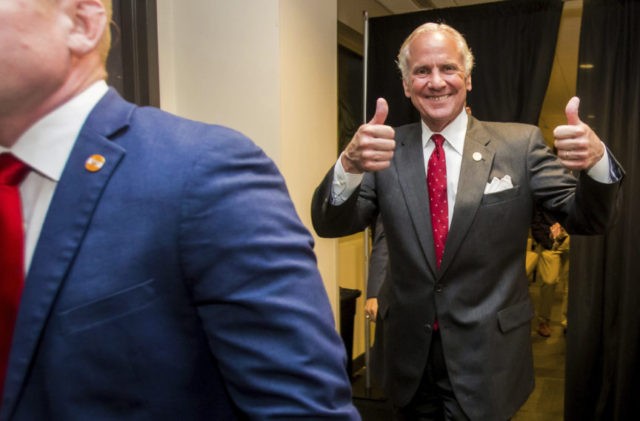NEW YORK (AP) — As Donald Trump’s party came together, a 28-year-old liberal activist ousted top House Democrat Joe Crowley in the president’s hometown Tuesday night, a stunning defeat that suddenly forced Democrats to confront their own internal divisions.
Crowley, the No. 4 House Democrat and until Tuesday considered a possible candidate to replace Nancy Pelosi as leader, lost the first competitive primary he had faced in more than a decade to Alexandria Ocasio-Cortez, a former aide to the late Massachusetts Sen. Ted Kennedy.
Crowley’s loss, the first defeat of the primary season for a Democratic incumbent. Echoed across the political world, sending the unmistakable message that lingering divisions between the Democratic Party’s pragmatic and more liberal wings may be widening in the early years of the Trump presidency.
“Perhaps he should have been nicer, and more respectful, to his President!” Trump tweeted, oddly taking credit for a victory by a candidate more liberal than Crowley.
All in all, Trump had reason to celebrate Tuesday night as all three of his endorsed candidates survived primary challenges that could have embarrassed him and the party.
Those included former Republican presidential nominee Mitt Romney, who once branded Trump “a fraud” but has changed his tune in the past two years.
None of the day’s contests mattered more to Trump than the one in South Carolina. Gov. Henry McMaster, one of the president’s earliest and strongest supporters who survived an unusually tough challenge from a political newcomer, self-made Republican millionaire John Warren.
The White House went all-in for the governor in recent days, dispatching the president and the vice president to the state in an effort to prevent a political debacle.
Trump has a mixed track record when campaigning for other candidates: His preferred candidates have suffered stinging losses in Alabama and western Pennsylvania in recent months.
Voters cast ballots across seven states on Tuesday as the 2018 midterm battlefield continues to take shape: South Carolina, New York, Oklahoma, Mississippi, Maryland, Colorado and Utah.
With the November general election a little more than four months away, more than half the states had selected their candidates after the day’s final votes were counted.
History suggests that Trump’s Republican Party, like the parties of virtually every first-term president dating back to Ronald Reagan in 1982, will suffer losses this fall.
Yet Crowley’s loss suggests that Democrats must overcome intraparty divisions if they hope to take control of Congress and key governors’ offices nationwide.
In New York, Ocasio-Cortez ran as a working-class daughter of an immigrant, casting Crowley as elitist out of touch with the community.
“These results are also a shot across the bow of the Democratic establishment in Washington: a young, diverse, and boldly progressive Resistance Movement isn’t waiting to be anointed by the powers that be,” said Matt Blizek, of MoveOn, which backed Crowley’s challenger.
Elsewhere in New York City, convicted felon Michael Grimm lost his political comeback attempt, which was more good news for Trump.
Grimm had held the Staten Island seat until 2015, when he pleaded guilty to knowingly hiring immigrants who were in the country illegally to work at his Manhattan restaurant and cooking the books to hide income and evade taxes.
Given his political baggage, a Grimm victory would have jeopardized the seat in this fall’s general election.
More than 2,000 miles (3,200 kilometers) away in deep-red Utah, former Massachusetts Gov. Romney defeated little-known state Rep. Mike Kennedy, who questioned Romney’s conservative credentials and ability to work well with the president. Romney, too, was endorsed by Trump despite his aggressive criticism of Trump before his election.
In a weekend op-ed published in The Salt Lake Tribune, Romney wrote that the Trump administration’s policies have exceeded his expectations, but he pledged to “continue to speak out when the president says or does something which is divisive, racist, sexist, anti-immigrant, dishonest or destructive to democratic institutions.”
Not to be forgotten: races to determine gubernatorial candidates in Maryland, Colorado and Oklahoma. Oklahoma was also deciding whether to legalize the cultivation, possession and use of marijuana for medicinal purposes.
In Maryland, the State Board of Elections was contacting as many as 80,000 voters whose registration information had not been updated, the result of a computer problem. Voters affected by the problem were asked to cast provisional ballots, which would not be counted until July 5, officials said. They added that the problem was related to a programming error, not infiltration from an outside source.
The most telling test of Trump’s influence was in South Carolina, where McMaster — elevated to the state’s top office last year when Nikki Haley became U.N. ambassador — had seemed in jeopardy. Two weeks ago, the governor failed to win the GOP primary outright, requiring a runoff election with Warren.
McMaster shocked even his closest advisers when, as lieutenant governor in early 2016, he became the first statewide-elected official in the country to back Trump’s White House bid.
___
Kinnard reported from South Carolina. AP writers Brian Witte in Annapolis, Maryland, and Lindsay Whitehurst in Salt Lake City contributed.
___
Find all of our primary coverage here: https://apnews.com/tag/Primaryelections

COMMENTS
Please let us know if you're having issues with commenting.